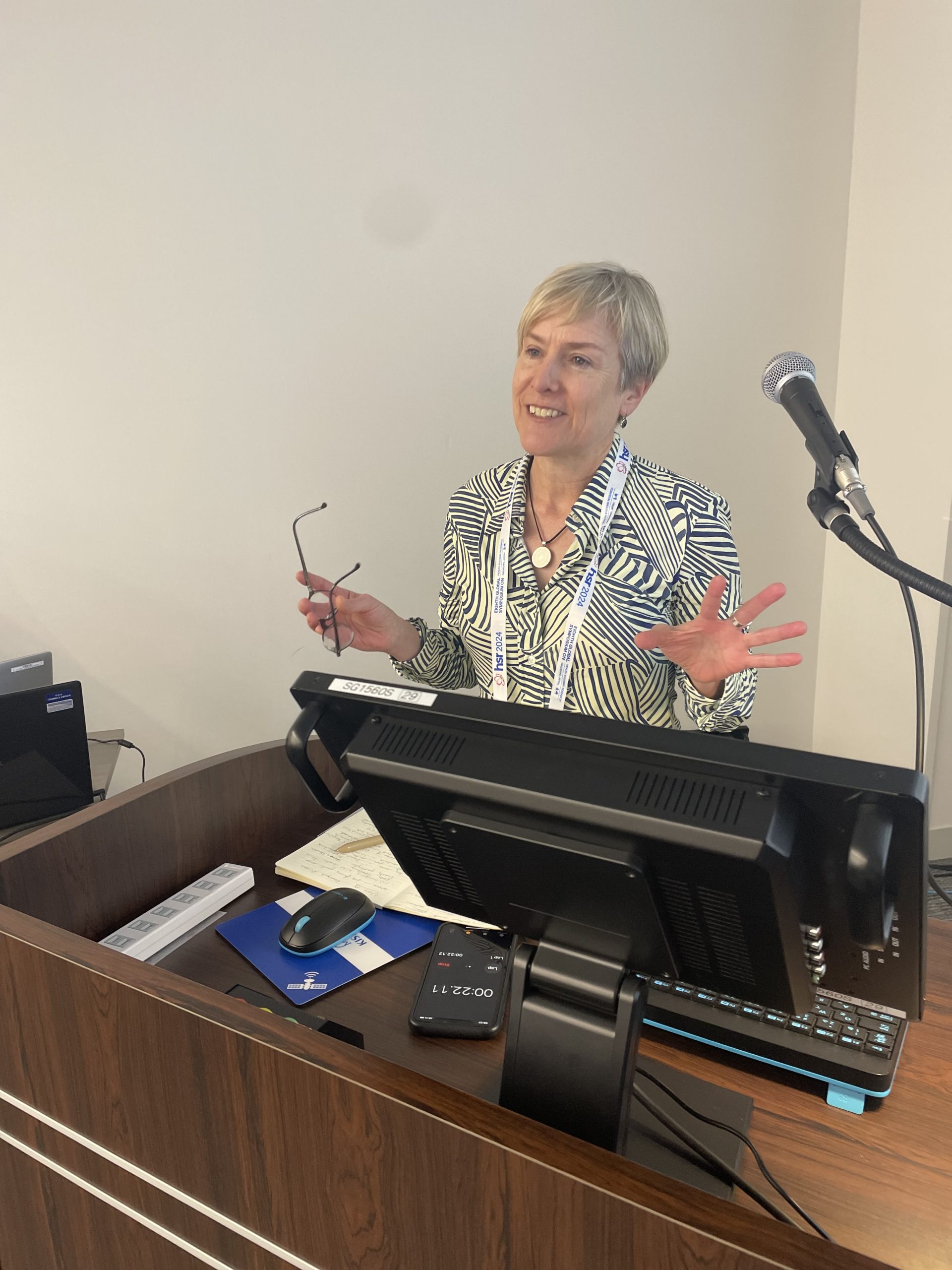Addressing social, environmental and ecological Justice in Health Policy and Systems Research
On 19 November 2024, at the Global Symposium on Health Systems Research, a critical session was held to address the complex intersections of social, environmental and ecological justice within Health Policy and Systems Research (HPSR). With experts from diverse fields, the discussion unpacked key concepts, shared dilemmas and explored actionable pathways to integrate justice in HPSR practices. This blog by Kate Hawkins (Pamoja Communications Ltd) is a summary of the insights shared. The event was chaired by Sassy Molyneux (University of Oxford).
Key discussions and insights
1. Bridging dimensions of justice: Power, recognition, wellbeing, inclusion and harmony
Bridget Pratt (Queensland Bioethics Centre, Australian Catholic University, Australia) highlighted the distinctions between social, environmental and ecological justice. While social and environmental justice emphasize the instrumental value of nature for human welfare, ecological justice considers what the planet itself is owed. A framework was presented that addressed justice dimensions across:
- Power: Reducing unfair human dynamics (e.g., racism, coloniality) and avoiding exploitative human-nature relationships.
- Recognition: Valuing human and ecological diversity, including local and traditional knowledge.
- Wellbeing: Ensuring an adequate level of wellbeing and functioning for humans and nature
- Inclusion: Ensuring all affected voices including the present generation, future generations, and nature shape decisions.
- Harmony: Promoting intergenerational and human-nature cohesion and solidarity.
To implement sustainable healthcare, approaches such as green infrastructure, eco-friendly care delivery and ethical procurement were suggested. But these are not always straightforward interventions and can involve trade-offs between the different axes (social vs environmental and ecological) and dimensions of justice.
2. Epistemic justice and respect for local knowledge
Seye Abimbola (University of Sydney) underscored the importance of epistemic justice—valuing diverse capacities for knowledge. Examples included acknowledging indigenous wisdom and addressing the biases of high-income narratives that often sideline the aspirations of developing country thinkers. A critical call was made to reframe environmental issues through the lens of those directly affected, promoting upstream solutions and inclusive participation.
3. Rethinking One Health: An integrated and decolonial approach
Rosie Steege (GEAR Up) introduced One Health, emphasizing the interconnectedness of humans, animals and ecosystems. Despite the potential of One Health, an anthropocentric and biomedical focus limits the scope of work on antimicrobial resistance (AMR) – a critical One Health issue. This creates epistemic and environmental injustices. For example, AMR is deeply tied to structural inequities and environmental racism, highlighting the need for a paradigm shift. Suggested actions to embed both social and environmental justice into One Health included:
- Decentering human perspectives in ethical frameworks.
- Recognizing indigenous contributions.
- Critical and reflexive practice
4. Justice in Pandemic Preparedness
Hayley MacGregor (Institute of Development Studies) delved into the tensions between pandemic preparedness and local realities. Policies like discouraging backyard farming in response to zoonotic diseases often ignore the socioeconomic implications for small farmers, who rely on livestock for nutrition and livelihood. Her examples highlighted the disconnect between top-down health policies and the lived realities of vulnerable populations.
5. Critiquing capitalism’s role in injustice
Manasee Mishra (Parul University) drew attention to capitalism as a system responsible for both environmental degradation and social inequities. Capitalism is the dominant economic system in the world today. Its consumerist model is exploitative of nature. Its for-profit motive creates and perpetuates some forms of inequities, marginalizing groups and reinforcing injustices. The current system is unsustainable, harming both the planet and the people. Sustainability and equity have to be prioritized going forward, irrespective of the economic system that is adopted.
6. Promoting decolonial practices in HPSR
Nadia Tagoe (Kwame Nkrumah University of Science and Technology) outlined principles for decolonial action:
- Epistemic decolonization: Removing hierarchies in knowledge production.
- Pluriversality: Allowing diverse ways of knowing to coexist.
- Desilencing: Empowering marginalized voices and knowledge.
These principles emphasize reflexivity, challenging colonial legacies and envisioning equitable futures.
7. Expanding space for varied epistemological perspectives
Nancy Kagwanja (KEMRI-Wellcome Trust) reiterated the colonial practices in the production of global health knowledge, such as:
- Paywalls
- Prohibitive publication fees
- Dominance of elite authorship groups in publications
She challenged us to go beyond asking, “Who tells the story?’ And reflect on, ‘What kinds of stories do we want to tell?”
She argued that there is limited epistemological diversity in the global health publishing landscape. The research that rests on relativist epistemologies (non-positivist qualitative and interpretive methodologies) are under-represented in prestigious global health journals and research linked to explicit knowledge is privileged. She called for an expanded space for varied epistemological perspectives, specifically the inclusion of research that i) values the tacit, experiential knowledge possessed by actors in low-income and middle-income countries, and legitimises the perspectives of local doers and thinkers; ii) pays careful attention to context, and does not treat local realities as mere background occurrences; and iii) and that draws on alternative, counter-dominant epistemologies, that allow for the crucial examination of power imbalances in global health
8. Putting principles into action
Emma Rhule (UNU-IIGH) talked about their experience in putting some of these principles into institutional practice. This included through the creation of internal safe spaces for uncomfortable conversations. People were allowed to show vulnerability and lack of precision in language and understanding of concepts to allow for dialogue. One of the important learnings was that many people are fearful of putting their head above the parapet (it can take enormous amounts of privilege or naivety!) People needed to be brought along on a journey to learning which was supportive.
Pathways forward
This session reaffirmed the necessity of integrating justice in HPSR, not as an abstract ideal but as a concrete framework for transforming research, partnerships, and policies. The collective vision is clear: a pluralistic, inclusive, and just approach to health systems that respects both human and planetary boundaries.

